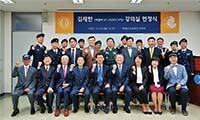Shorter Radiation Course For Cancer of the Breast

Less radiation may help protect a breast cancer patient’s heart and lungs.
By DENISE GRADYThree weeks of radiation treatment work just as well as the usual course of five weeks or more for women with early-stage breast cancers, Canadian researchers have reported, after monitoring a large group of patients for 12 years.
The results, presented recently at a conference in Boston, provide some of the strongest evidence that radiation schedules can safely be shortened to make life easier for patients and to let clinics reduce their waiting lists and treat more women without buying more machines.
The typical schedule now involves five to seven weeks of daily treatments, and most women would welcome a chance to get it over with faster - especially those who work, have small children or live far from the clinic.
Breast cancer accounted for 7.9 million deaths (or around 13 percent of all deaths worldwide) in 2007, according to the World Health Organization. About 180,000 women a year develop breast cancer in the United States, and most need radiation. From 30 percent to 40 percent may be candidates for the type of treatment given in the study.
Some centers in the United States offer shorter courses of treatment, but they are more widely available in Canada and parts of Europe.
“We’ve really got to give it serious consideration in the United States,” said Dr. Anthony L. Zietman, a radiation oncologist at Harvard Medical School and the Massachusetts General Hospital Cancer Center, and president- elect of the American Society for Therapeutic Radiology and Oncology. He was not involved in the Canadian study.
But Dr. Zietman cautioned that the results applied only to women with early cancers like those in the study, which were removed by lumpectomy and had not spread to the lymph nodes. Often, women with such early cancers do not need chemotherapy.
Other major changes in radiation are also in the works. Doctors are experimenting with ways to treat just part of the breast rather than all of it, and to make the treatment safer, they are trying to avoid exposing the heart and lungs to radiation.
The purpose of radiation is to keep cancer from coming back in the same breast where it first occurred, by killing any tumor cells that may have evaded surgery and chemotherapy. Cancer cells are more vulnerable to radiation than are normal ones, and the treatment has always been a balancing act between giving enough radiation to destroy the tumor cells but not enough to cause serious damage to healthy tissue and organs.
The changes now being made result in part from the overall success in treating early breast cancers, Dr. Zietman said. Survival rates have climbed so high - 98 percent of women with earlystage cancers survive at least five years - that it is now considered reasonable to step back, look at women’s quality of life and try modifying the regimens to make treatment less onerous.
“It’s a bit of a change in our thinking,” Dr. Zietman said.
Researchers also hope that faster treatment will help make radiation available to more women. Currently, about 20 to 30 percent of women in North America who need it skip it.
And some women who could have lumpectomy plus radiation choose mastectomy instead, simply to avoid radiation, because they live too far from a clinic to travel back and forth for all the treatments.
Not all medical centers offer the newer techniques, and they are not right for every woman. But for many women, there are choices where none existed before .
“Patients have to speak up,” Dr. Zietman said.
If the standard regimen is recommended, he said, a woman should ask:
“Does it have to be that way- Am I one of the people who could be treated with partial breast irradiation, or, if I need the whole breast treated, could it be done in some more abbreviated fashion?”
He added, “Maybe they can, maybe they can’t.”
Some radiation oncologists may resist change, fearful of giving up the tried and true formulas they were taught, Dr.
Zietman said. He noted that the standard treatment had 30 years of evidence to back it up, whereas the newer approach had less than half that. But still, the field is moving ahead.
“You don’t give all women with breast cancer the same treatment,” he said. “You base it on what they have, and who they are.”
스마터리빙
more [ 건강]
[ 건강]이제 혈관 건강도 챙기자!
[현대해운]우리 눈에 보이지 않기 때문에 혈관 건강을 챙기는 것은 결코 쉽지 않은데요. 여러분은 혈관 건강을 유지하기 위해 어떤 노력을 하시나요?
 [ 건강]
[ 건강]내 몸이 건강해지는 과일궁합
 [ 라이프]
[ 라이프]벌레야 물럿거라! 천연 해충제 만들기
 [ 건강]
[ 건강]혈압 낮추는데 좋은 식품
[현대해운]혈관 건강은 주로 노화가 진행되면서 지켜야 할 문제라고 인식되어 왔습니다. 최근 생활 패턴과 식생활의 변화로 혈관의 노화 진행이 빨라지고
사람·사람들
more많이 본 기사
- [‘로드 레이지’ 한인 피살 현장 상세 상황] 끼어들기 시비가 비극으로… 차에서 내려 “쏴봐라” 언쟁
- [이민 단속] 여권 소지 시민권자들 … 1
- 크리스마스 대형 폭풍… 침수·산사태 대비 ‘비상’
- [성탄절 문 여는 곳은] 코스코·월마트 닫고… CVS는 영업
- 가난해서 흙 팠는데… ‘다이아’ 캤다
- 취업비자(H-1B), 고연봉자 우선 발급
- [이민 단속] 새해에도 더 공격적 단속
- 연방대법, 시카고 주방위군 투입 ‘기각’
- MC몽, 차가원 회장 충격 불륜 부인.. “채무 120억 당연히 이행”
- 두 손 모아 성탄기도… “온 세상에 평화를”
- 우크라, 20개항 종전안 최신판 공개…영토 할양은 ‘미해결’
- 뉴욕한국라이온스클럽· 뉴욕한인합창단 한 해 마무리 합동 송년회 성황
- 트럼프, ‘나비넥타이’ 매고 연말 대중문화 시상식 일부 진행
- ‘마약 혐의’ 남양유업 창업주 외손녀 황하나 경찰에 체포
- [부 고] 박종군 전 뉴욕청과협회장 별세
- 군 장교에서 글로벌 교육 리더로‘제2의 인생’ 을 살다
- 역주행 승용차 덮쳐 한인 등 2명 사망
- “온 세상에 평화를⋯”
- 트럼프 행정부, H-1B비자 추첨 내년 2월 폐지…고임금 인력 우대
- 이대우 뉴저지한인회장, “적자 개인적으로 전액변제”
- 차기 대선 선호도… 공화 ‘밴스’ ·민주 ‘뉴섬’ 선두
- H-1B비자 고임금·경력자에 우선권
- 트럼프 “마두로 물러나라” 최후통첩
- 해병대전우회 동부연합회·뉴욕해병대전우회 송년회
- 불체자 자진출국하면 지원금 3배로 ‘3천불’
- 엡스타인 자료 추가 공개… “전용기에 트럼프 8번 타”
- 뉴욕시 최저임금 인상⋯ 1월1일부터 17달러
- [삶과 생각] 제도화된 불법, 합법의 가면을 쓴 민주주의 붕괴
- 윌리엄 컬렌 브라이언트 고교 한국어반 삼성전자 북미사옥 현장학습
- 비전케어 USA 무료 백내장 수술
- [‘로드 레이지’ 한인 피살 현장 상세 상황] 끼어들기 시비가 비극으로… 차에서 내려 “쏴봐라” 언쟁
- 46회째 1등 안나온 파워볼 복권 당첨금 17억달러로 껑충 뛰어
- 뉴저지한국학교 종강식^ 학습발표회
- 아시안아메리칸사법경찰자문위원회 송년회
- ‘파워볼’ 열풍 계속… 오늘 잭팟상금 17억 달러
- 롱아일랜드한국학교 종강식
- 해외서도 극과극 반응’대홍수’, 넷플릭스 글로벌 1위 차지”SF 걸작 vs 최악”
- 온라인쇼핑과 반품, 그리고 그 이후 1
- 정동원, 내년 2월 23일 해병대 입대..전역 예정일은 27년 8월 22일
- 트럼프의 새 독트린 “미국을 다시 왜소하게”
- [미국은 지금] MAGA의 분열, 예… 1
- [남가주 6개 은행 전국 예금 현황] 1억달러 이상 예금고 지점 99개
- 퀸, 51년 전 ‘미발표곡’ 공개 녹음 뒤 앨범에 안 담긴 곡
- 미 해군 군함 명칭 전통 깬 ‘트럼프급 전함’
- 한국계 타자 레프스나이더 시애틀과 625만달러 1년 계약
- ‘100억달러 수주’ 한화오션, 내년 FPSO 시장 노린다
- 이하늬, 기획사 미등록 혐의 검찰 송치.. “10월 정식 등록”
- “은·로빈후드·인공지능 주식에 집중 투자”
- “국악 아름다움 나눠요”
- 美, 물류거점창고에 불체자 8만명 수용 추진… ‘아마존택배’ 방식
1/5지식톡

-
 미 육군 사관학교 West Poin…
0
미 육군 사관학교 West Poin…
0https://youtu.be/SxD8cEhNV6Q연락처:wpkapca@gmail.comJohn Choi: 714-716-6414West Point 합격증을 받으셨나요?미 육군사관학교 West Point 학부모 모…
-
 ☝️해외에서도 가능한 한국어 선생님…
0
☝️해외에서도 가능한 한국어 선생님…
0이 영상 하나면 충분합니다!♥️상담신청문의♥️☝️ 문의 폭주로 '선착순 상담'만 진행합니다.☎️ : 02-6213-9094✨카카오톡ID : @GOODEDU77 (@골뱅이 꼭 붙여주셔야합니다…
-
 테슬라 자동차 시트커버 장착
0
테슬라 자동차 시트커버 장착
0테슬라 시트커버, 사놓고 아직 못 씌우셨죠?장착이 생각보다 쉽지 않습니다.20년 경력 전문가에게 맡기세요 — 깔끔하고 딱 맞게 장착해드립니다!장착비용:앞좌석: $40뒷좌석: $60앞·뒷좌석 …
-
 식당용 부탄가스
0
식당용 부탄가스
0식당용 부탄가스 홀세일 합니다 로스앤젤레스 다운타운 픽업 가능 안녕 하세요?강아지 & 고양이 모든 애완동물 / 반려동물 식품 & 모든 애완동물/반려동물 관련 제품들 전문적으로 홀세일/취급하는 회사 입니다 100% …
-
 ACSL 국제 컴퓨터 과학 대회, …
0
ACSL 국제 컴퓨터 과학 대회, …
0웹사이트 : www.eduspot.co.kr 카카오톡 상담하기 : https://pf.kakao.com/_BEQWxb블로그 : https://blog.naver.com/eduspotmain안녕하세요, 에듀스팟입니다…
케이타운 1번가
오피니언
 정숙희 논설위원
정숙희 논설위원온라인쇼핑과 반품, 그리고 그 이후
 파리드 자카리아 / 워싱턴포스트 칼럼니스트 / CNN ‘GPS’ 호스트
파리드 자카리아 / 워싱턴포스트 칼럼니스트 / CNN ‘GPS’ 호스트 트럼프의 새 독트린 “미국을 다시 왜소하게”
 김동찬 시민참여센터 대표
김동찬 시민참여센터 대표 [미국은 지금] MAGA의 분열, 예견된 균열의 시작
 임지영 (주)즐거운 예감 한점 갤러리 대표
임지영 (주)즐거운 예감 한점 갤러리 대표 [수요 에세이] 삶이라는 배를 타고
 이영창 / 한국일보 기자
이영창 / 한국일보 기자[지평선] ‘인간GPT’ 환각의 부작용
 조환동 / 편집기획국장·경제부장
조환동 / 편집기획국장·경제부장 AI로 가속화되는 노동시장 개편
 민경훈 논설위원
민경훈 논설위원‘크리스마스 캐롤’과 산타 클로스
 정재민 KAIST 문술미래전략 대학원 교수
정재민 KAIST 문술미래전략 대학원 교수 [정재민의 미디어풍경] 적과의 동침, 협력하며 경쟁하기
 김영화 수필가
김영화 수필가 [화요칼럼] 단호박의 온기
1/3지사별 뉴스

“온 세상에 평화를⋯”
숨가쁘게 달려온 2025년을 이제 1주일 남짓 남긴 채 크리스마스 이브를 맞는다. 다사다난했던 한 해를 되돌아보며 마무리하는 연말 시즌과 크리…
H-1B비자 고임금·경력자에 우선권

‘올해는 ICE 이민자 체포 광풍의 해’
올 한해동안 버지니아와 메릴랜드, DC 등에서 연방 이민당국에 체포된 사람이 1만명이 훌쩍 넘는 것으로 조사됐다. 또 미 전국적으로는 22만명…
“ATM기 사용하기 겁나네”

연말 ‘로드레이지’ 비극… 한인 총격 피살
연말을 맞아 도로 위에서 순간적으로 벌어진 운전 중 시비가 40대 한인 가장의 총격 피살 비극으로 이어졌다. 워싱턴주 레이시 경찰국과 서스턴 …
[‘로드 레이지’ 한인 피살 현장 상세 상황] 끼어들기 시비가 비극으로… 차에서 내려 “쏴봐라” 언쟁

오늘 하루 이 창 열지 않음 닫기 





















































.png)


댓글 안에 당신의 성숙함도 담아 주세요.
'오늘의 한마디'는 기사에 대하여 자신의 생각을 말하고 남의 생각을 들으며 서로 다양한 의견을 나누는 공간입니다. 그러나 간혹 불건전한 내용을 올리시는 분들이 계셔서 건전한 인터넷문화 정착을 위해 아래와 같은 운영원칙을 적용합니다.
자체 모니터링을 통해 아래에 해당하는 내용이 포함된 댓글이 발견되면 예고없이 삭제 조치를 하겠습니다.
불건전한 댓글을 올리거나, 이름에 비속어 및 상대방의 불쾌감을 주는 단어를 사용, 유명인 또는 특정 일반인을 사칭하는 경우 이용에 대한 차단 제재를 받을 수 있습니다. 차단될 경우, 일주일간 댓글을 달수 없게 됩니다.
명예훼손, 개인정보 유출, 욕설 등 법률에 위반되는 댓글은 관계 법령에 의거 민형사상 처벌을 받을 수 있으니 이용에 주의를 부탁드립니다.
Close
x